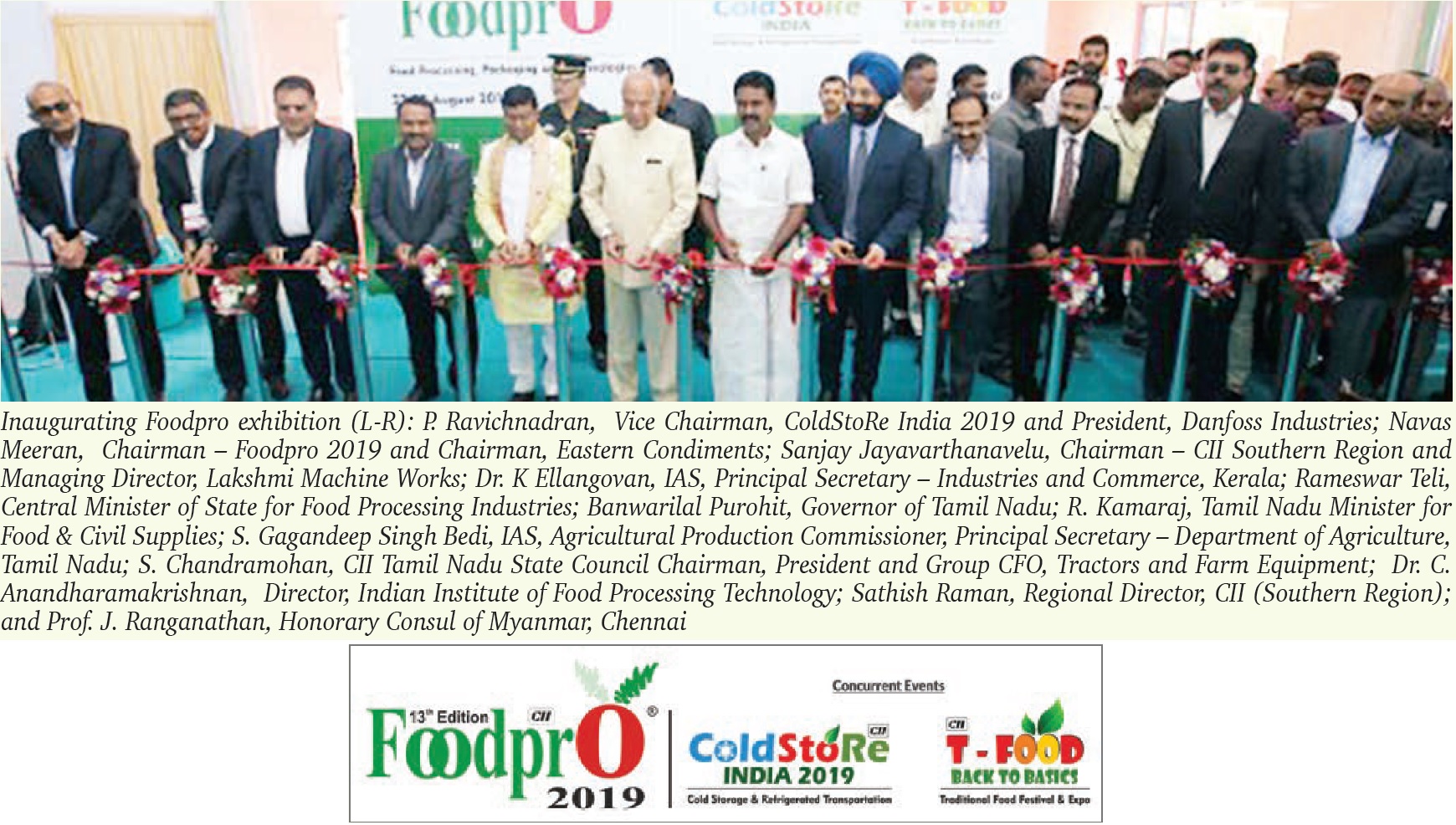The 13th edition of Foodpro 2019 – an exclusive initiative on Food Processing, Packaging and Technology – was organized from August 23 to 25 at Chennai Trade Centre, Chennai.
Coinciding with Foodpro, the second edition of ColdStoRe India 2019 – a focused initiative on Cold Storage and Refrigerated Transportation, and T-Food 2019 – an exclusive showcase on Traditional Foods – were organized. Foodpro 2019 Exhibition and Conference focused on the latest trends, innovations, R&D, equipment and technologies, provided a platform to various stakeholders to learn the best practices, and deliberated on the growth in the sector by fostering new business opportunities and technology adoption. Banwarilal Purohit, Governor of Tamil Nadu, was the Chief Guest for the Foodpro 2019 Exhibition Inaugural. Rameswar Teli, Central Minister of State for Food Processing Industries, was the Guest of Honour at the Inaugural Session of Foodpro 2019 Conference.
Inaugurating the 13th Edition of Foodpro 2019 organised by the Confederation of Indian Industry (CII), Banwarilal Purohit said that the country’s aim to become a $5 trillion economy by 2025 needs an overall growth of 9 per cent or more, and the food industry should commit itself to grow with speed and with scale to offer food safety and security to all citizens. He said as of now the food processing industry contributes around 9 per cent of the country’s manufacturing output and the sector, witnessing a growth of 11 per cent, is expected to touch the $600 billion milestone next year. Stating that the food processing sector offers employment to about 12.8 per cent of the workforce in the organised sector and about 13.7 per cent in the unorganised sector, he said that there should be concerted efforts to share the growth story with the farmers of the country. “India’s dairy sector is a great example of the multiplier effect the food industry can have in reducing the financial stress and boost the complementary income of the farmers. Dairy as one third of the food industry could generate around 6,000 jobs for every one lakh litres of milk; the industry employs about 90 lakh people and it could be scaled up to 1.2 crore”, he noted. He also said the government had set a target to create direct and indirect employment for 5,30,500 persons in the food processing sector by 2020.
He further said that India could well become the food factory of the world with a target of Rs. 100 lakh crore worth of investment in the next five years. To promote the food
processing sector, 100 per cent FDI was allowed under the automatic route and the same was also allowed through government approval route for retail trading in respect of
food products manufactured or produced in the country. The Centre provides financial assistance of up to Rs. 50 crore per mega food project to address critical gaps in the value chain including infrastructure, modernisation, productivity, postharvest management and quality control, he remarked.
The Governor lauded the Tamil Nadu government for becoming one of the leading food exporters of diverse food products like marine products, rice, cereal and dairy products, as also the efforts made by the state to give more impetus to achieve its objectives of increasing the income of farmers and establishing cold storage facilities for perishable products. Rameswar Teli, in his address, said that the food processing ministry has launched several schemes for the benefit of the food processing sector. “In Tamil Nadu, three schemes have been completed out of 12, and there are efforts to create mega and mini food parks in the state with an allocation of 50 acres and 10 acres respectively”, he said.
R. Kamaraj, Tamil Nadu Minister for Food and Civil Supplies, said the state had set apart Rs. 482 crore for the food processing sector in the form of various schemes to benefit the farming community. He also said that Tamil Nadu shows the way to other states in creating food security for the people though the public distribution system. “There are 1,800 direct paddy procurement centres in the state that can benefit 5 lakh farmers, who can produce 20 lakh metric tonnes of paddy, and a sum of Rs. 1,450 crore has been earmarked for the godowns”, he added.
Dr. K. Ellangovan, Principal Secretary, Department of Industries and Commerce, Kerala said the state of Kerala has two food parks and five industrial parks with a focus on
developing MSMEs. Sanjay Jayavarthanavelu, Chairman, CII Southern Region and CMD, Lakshmi Machine works, said in his address that the food processing industry needs to focus on capacity building initiatives and skill development all across the value chain to gain a competitive advantage globally. It would also strengthen the linkages across the agriculture and food processing industry with the objective of building a connected and integrated value chain that in turn can result in minimising spoilage, increasing value addition and contributing significantly towards enhancing farmers’ income.
Navas Meeran, Chairman, Foodpro 2019 and Chairman, Eastern Condiments, said that the food processing industry needs to focus on value added products for its sustenance with a focus on the ten cold storage facilities that had come up for food processing. He emphasized that the food processing industry needs stronger infrastructural facilities, better quality control and testing facilities and an ecosystem to create a robust supply chain; availability of raw material, competitive inventory management, a conducive taxation regime, best in class packaging solutions and adherence to global safety practices will boost the food processing industry and the
inputs sector to the next level of growth trajectory.
P. Ravichandran, Chairman, Agriculture and Food Processing Sub-Committee, CII-SR and President, Danfoss Industries, said that the food processing industry stands at $450 billion and it could move up to $1 trillion by 2022 as more and more start-ups are emerging to help the farming community. Combination of digitalization, start-up culture and continuous focus on sustainability would redefine the Indian Dairy Industry, which has the potential to touch $200 bn in the next 3 years, he said. Dairy farm mechanization like chilling and storage technologies and deployment of green energy in the dairy sector provide huge opportunities for growth of the dairy industry, and by 2022 we would be able to export some of our technologies to geographies like the African countries and help them adopt the technologies that we have implemented
successfully here, he added.
Dr. C. Anantharamakrishnan, Director, Indian Institute of Food Processing Technology, said that many local brands had surfaced in the food processing industry though people opted for traditional foods.
S. Chandramohan, Chairman, CII Tamil Nadu and Group CEO and President, TAFE proposed a vote of thanks. The Government of Tamil Nadu expressed interest in
signing an MoU with CII for a project on Green Logistics Corridor for Perishables – Southern Grid. The project intends to develop a viable supply chain model of networks to enable organized movement of perishables across the five southern states of the country and identify the optimal infrastructure requirement across the corridor for movement of perishables using multimodal carriers (rail, road and sea) connecting the consumption and production centers.
Highlights of Foodpro 2019
• 310 exhibitors with 10,200 sq. m. display area
• Government of Tamil Nadu participated as the Host State
• Government of Kerala participated as the Partner State
• International representation from Germany, Italy, Malaysia, the Netherlands, Spain, Turkey, the UAE and the USA
• Supported by NSIC and 21 sectoral associations
• Three-day sectoral conferences on Food Processing, Dairy Technologies and Traditional Foods
• 23,000 business/trade visitors and 600 delegates
• Release of report on ‘Indian Food Processing Sector Trends and Opportunities’
• 800 B-2-B Meetings
Disclaimer: The information provided within this publication / eBook/ content is for general informational purposes only. While we try to keep the information up-to-date and correct, there are no representations or warranties, express or implied, about the completeness, accuracy, reliability, suitability or availability with respect to the information, products, services, or related graphics contained in this publication / eBook/ content for any purpose. Any use of this information is at your own risk.
 Youth
Youth
 Women
Women
 Research for Ishrae
Research for Ishrae







